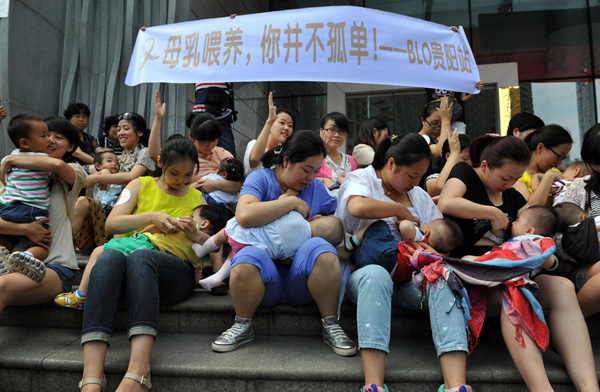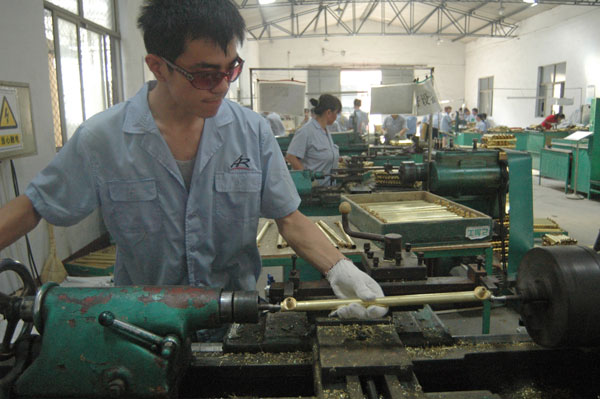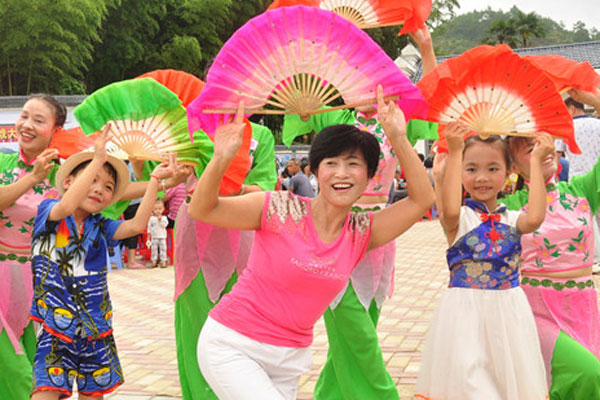Breast-feeding pushed for infant health
Updated: 2015-08-04 07:10
By Wang Xiaodong(China Daily)
|
|||||||||||
Popularity has declined over past decade with the widespread promotion of powdered milk
 |
|
Mothers feed their children to promote breast feeding at a shopping mall in Guiyang,Guizhou province on July 28, 2014. [Photo/CFP] |
China's top health authority urged on Monday that greater efforts are made to encourage breast-feeding.
It improves maternal and infant well-being, but its popularity has declined over the past decade despite clear health benefits, the authority said.
Globally, about 35 percent of deaths of children under age 5 are attributed to malnutrition, and improving breast-feeding can decrease the infant mortality rate by 13 percent, Wang Guoqiang, vice-minister at the National Health and Family Planning Commission, said on Monday.
Wang was speaking at an event to mark the World Breast-Feeding Week, which continues through Friday.
"China is one of the countries with the highest employment rates for women, and guaranteeing women employees' rights to breast-feeding is very important to decrease the mortality rate of infants and promote their healthy growth," Wang said.
Breast-feeding is the best way to provide infants with the nutrients they need.
The World Health Organization recommends exclusive breast-feeding for babies until they are 6 months old, and continued breast-feeding with the addition of other nutritious foods until children are 2 years old or more. "Breast milk is the most nutritious source for humans and provides complete and rich nutrition for newborn babies. It cannot be substituted by milk powders," said Zhang Shuyi, a researcher at the Capital Institute of Pediatrics.
"It also contains many substances that can increase babies' immune system against diseases," she said.
Less than 28 percent of babies under 6 months old were exclusively breast-fed in China in 2013, compared with 67 percent in 1998, according to the commission last year.
In contrast, the central government wants more than 50 percent of all infants under 6 months old to be exclusively breast-fed by 2020, under a guideline released by the government in 2011.
According to Zhang, breast-feeding has declined for many reasons, including a lack of maternal health education.
The widespread promotion of powdered milk also has encouraged the use of formula, he said.
The central government has taken measures in recent years to encourage breast-feeding, such as issuing regulations to ensure maternity leave for female employees and asking companies to set up special rooms so mothers can breast-feed their babies.
In Beijing, the breast-feeding rate for infants under 6 months old reached 92 percent last year, and 70 percent of all infants under 6 months old were exclusively breast-fed, said Gao Xiaojun, spokesman for the Beijing Commission for Health and Family Planning.
Related Stories
National breastfeeding awareness day marked in China 2015-05-20 11:16
Breastfeeding may reduce arsenic exposure in infants 2015-02-25 15:51
Breastfeeding rooms help working mothers 2014-09-05 09:05
2014 World Breastfeeding Week kicks off 2014-08-05 18:31
Today's Top News
Former British PM named in allegations of child sex abuse
Obama issues challenge on climate change
Erdogan pledges to fight back as PKK steps up attacks
AIIB, Silk Road parts of China's strategy to benefit the world
Overseas journalists invited to cover China's V-Day celebrations
Greek market tumbles after five-week shutdown
Malaysia seeks international help in search of MH370
French, Malaysian experts meet for MH370 probe
Hot Topics
Lunar probe , China growth forecasts, Emission rules get tougher, China seen through 'colored lens', International board,
Editor's Picks

|

|

|

|

|

|






